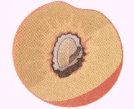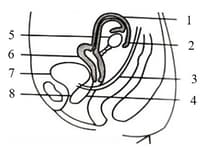Sexual Reproduction
Sexual Reproduction: Overview
This topic covers concepts, such as, Sexual Reproduction, Germ Cells, Cervix & Seed Germination etc.
Important Questions on Sexual Reproduction
Rewrite the terms in the correct order so as to be in a logical sequence.
Implantation, ovulation, child birth, gestation, fertilisation
What is the name of the duct formed by the union of the vas deferens with the duct of the seminal vesicle?
The ejaculatory duct in a human male transports sperm from the rete testes to the vas deferens.
The anther is a part of the carpel that receives pollen grains.
_____ is a part of the stamen that produces pollen grains.
Which of the following is the function of anther?
Explain double fertilisation with a labelled diagram.
The following diagram represents the vertical sectional view of the human female reproductive system.
Mention the name of the part labelled 5.
Which animals, among the given options, show internal fertilisation?
Fill in the blank with the correct option provided in the bracket.
External fertilisation takes place in _____(birds/amphibians/reptiles).
Pollen grain has two nuclei one is called generative nucleus and the other one is called (polar nucleus/ tube nucleus):
Give the term used for animals in which internal fertilization occurs and live young are born, but without the development of the placenta.
Name the phylum in which organisms have tube-feet and perform external fertilization.
Which organ enables the developing foetus to obtain nourishment from the mother’s blood?
The layer of the cell that forms the outer layer of the blastocyst is called _____.
_____ is a vestigial organ that acts as the site for the formation of blood cells in the developing embryo.
The uterus is also known as _____.
Write two merits of cross pollination.
The top part of pistil is:
Look at the given diagram and answer the following question.
Which part of the flower develops and become a food after fertilization?


